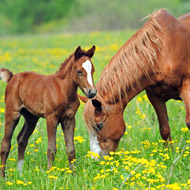AHT begins equine herpes virus vaccine research

Equine herpes virus causes respiratory disease, abortion or fatal illness in newborn foals.
The Animal Health Trust (AHT) has begun research into developing a new vaccine to protect against equine herpes virus (EHV-1).
Overseen by Dr Neil Bryant, the research comes after the AHT became aware of a pressing need for progress towards a new and improved EHV-1 vaccine.
In March, the Newmarket-based charity was called upon to work with the racing industry and affected parties in dealing with confirmed cases of EHV-1 abortion in Yorkshire and Suffolk. This need led to the development of an Equine Industries EHV Vaccine Steering Group, comprising of world-renowned experts on both human and equine herpes virus.
Chaired by Professor Joe Brownlie of the RVC, the steering group has looked at the existing scientific evidence and agreed the most appropriate way forward is for the AHT to design a modified live virus (MLV) vaccine.
“We’re at the beginning of a very exciting and potentially ground-breaking vaccine development,” said Dr Bryant. “Through our research, we will construct different viruses with attenuating mutations and assess their suitability as MLVs.
“We hope our findings will enable further development by vaccine manufacturers in creating an effective vaccine to protect against the serious clinical signs induced by EHV-1.”
EHV-1 causes respiratory disease, abortion or fatal illness in newborn foals. It also causes neurological disease in adult horses.
Whilst EHV can have severe consequences, there is no vaccine that is licensed to protect against the neurological form of the disease. Existing vaccines do not offer sufficient protection - something that was emphasised in 2016 by the Hertfordshire ‘abortion storm’ in fully vaccinated animals.
“EHV is a major welfare concern for horses and foals and causes emotional, as well as financial strains, on horse owners and breeders around the world,” said Dr Bryant. “It can strike any horse at any time so a vaccine will be of global welfare benefit to all horses, including the Thoroughbred and sports horse breeding industries, and would help control this serious and sometimes fatal disease.”



 The veterinary mental health charity Vetlife is inviting the veterinary community to join it for a sponsored cold-water dip.
The veterinary mental health charity Vetlife is inviting the veterinary community to join it for a sponsored cold-water dip.